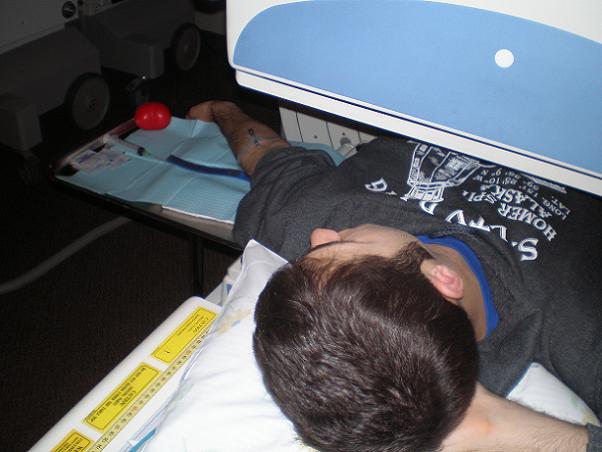
Consensus Paper Suggests Medtronic ITB Therapy is an Effective Treatment for Control of Severe Spasticity, a Frequent and Disabling Symptom of MS
February 04, 2011 02:22 PM Eastern Time
MINNEAPOLIS–(EON: Enhanced Online News)–A new scientific article has been published demonstrating the profound impact of spasticity on patients with multiple sclerosis and the benefits and underutilization of intrathecal baclofen (ITB) therapy from Medtronic, Inc. (NYSE: MDT) as a treatment option for these patients. The paper, published this week as an OnlineFirst article in Multiple Sclerosis Journal, recommends physician evaluation of ITB therapy as a treatment option for patients at all clinical stages of MS who are intolerant of or unresponsive to oral spasticity therapies.
“we are hopeful that this paper will encourage more physicians to offer the therapy to appropriate patients.”
“Severe spasticity is a debilitating condition that can have a negative impact on quality of life of patients with MS. While oral medications work to treat spasticity in some individuals, I see patients every day who can’t tolerate the side effects of large doses of medication necessary to treat the most severe cases,” said Mary Hughes, M.D., one of the article’s authors and chair, Division of Neurology, University Medical Group, Greenville Hospital system University Medical Center in Greenville, S.C. “The strong collection of clinical results on the use of ITB therapy in MS patients points to a clear need for physicians to help MS patients control their spasticity and restore quality of life with options like ITB therapy, which is safe and effective in carefully selected patients.”
The expert panel of authors, including leading MS clinicians from the United States and Europe, combined has more than 100 years of experience in MS management and has treated more than 1,500 MS patients worldwide. The article includes a review of literature on ITB therapy for spasticity in MS and provides expert opinion of the panel regarding patient selection and management of ITB therapy in MS patients. Medtronic sponsored the panel’s meeting and paper development.
according to survey results within the research summary, 84 percent of patients with MS reported at least some symptoms of spasticity, with 30 percent reporting moderate to severe symptoms. Of the 13 percent of MS patients who may be candidates for ITB therapy, only 1 percent of patients stated they were receiving the therapy. however, current data indicate that ITB therapy effectively and significantly reduces severe spasticity in ambulatory and non-ambulatory patients with MS.
The expert panel noted that the main barrier to the use of ITB therapy is that many physicians do not present ITB as a therapeutic option that is safe, effective and well-tolerated. This often occurs due to a lack of physician understanding of quality of life issues caused by spasticity, potential ITB benefits and appropriate patient selection, as well as their focus on disease-modifying therapies rather than symptom control.
“This article is a very powerful analysis of the need for greater consideration of ITB therapy by clinicians who manage MS,” said Tom Tefft, senior vice president and president of the Neuromodulation business at Medtronic. “We are hopeful that this paper will encourage more physicians to offer the therapy to appropriate patients.”
About Multiple Sclerosis and Spasticity
Approximately 300,000 Americans have MS, a chronic, often disabling disease of the central nervous system. Symptoms may include abnormal fatigue, impaired vision, loss of balance and muscle coordination, slurred speech, tremors, spasticity, bladder and bowel problems, difficulty walking, short-term memory loss, mood swings, and, in severe cases, partial or complete paralysis. Spasticity can occur when the part of the brain that controls voluntary movements is damaged or injured and results in tight, stiff muscles. In addition to being one possible symptom of MS, spasticity also can be a symptom of cerebral palsy, brain injury, spinal cord injury or stroke. For some people, the condition is so severe that it is impossible to voluntarily relax muscles.
About ITB Therapy
Medtronic ITB Therapy using the SynchroMed® II pump is the first and only fully programmable implantable drug pump available in the United States to treat severe spasticity. first approved in the United States in 1992, ITB is a complete drug delivery solution to optimize spasticity treatment and maximize function. The therapy delivers a baclofen injection directly to the intrathecal space where fluid flows around the spinal cord in patients with severe spasticity. More information is available at medtronic.com/your-health/severe-spasticity/about/index.htm
About Medtronic
Medtronic, Inc. (medtronic.com), headquartered in Minneapolis, is the global leader in medical technology – alleviating pain, restoring health, and extending life for millions of people around the world.
Any forward-looking statements are subject to risks and uncertainties such as those described in Medtronic’s periodic reports on file with the Securities and Exchange Commission. Actual results may differ materially from anticipated results.